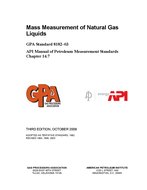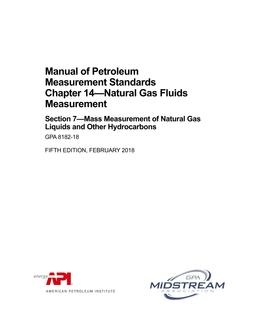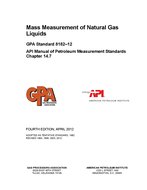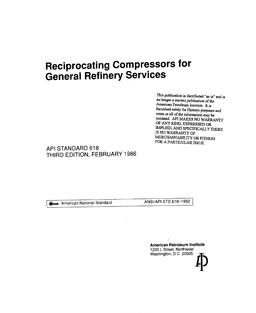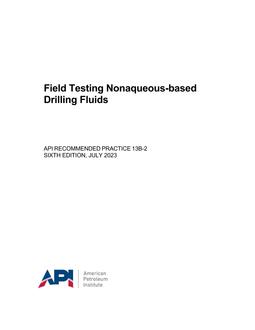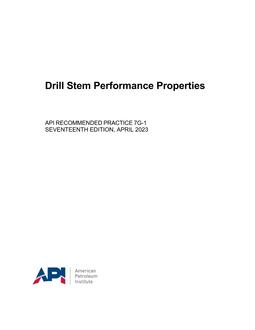API MPMS Chapter 14.7
Click here to purchase
This publication is to be used as a reference to select, design, install, operate, and maintain homogeneous, single-phase liquid mass measurement systems that operate in the density range from 0.3 to 0.7 grams per cubic centimeter (18.73 to 43.70 poundsper cubic foot). Measurement of liquids with densities below 0.3 and above 0.7 grams per cubic centimeter and measurement of cryogenic fluids are excluded from the scope of this document. Sampling equipment and techniques are discussed, and standards for analytic methods used to determine the composition of the sampled product are also cited. This standard was developed jointly by the Gas Processors Association (GPA), Section H, Product Measurement and Handling, and the American Petroleum Institute, Committee on Natural Gas Fluids Measurement.
Product Details
- Edition:
- 2nd
- Published:
- 01/01/1995
- Number of Pages:
- 8
- File Size:
- 1 file , 510 KB
- Product Code(s):
- H14072, H14072, H14072
- Note:
- This product is unavailable in Cuba, Iran, North Korea, Syria
API MPMS Chapter 14.7
Click here to purchase
This standard serves as a reference for the selection, design, installation, operation and maintenance of single-phase dynamic liquid mass measurement systems that operate in the 350 to 688 kg/m3 (0.350 to 0.689 relative density at 60°F) density range. The mass measurement systems within the scope of this document include inferred mass measurement, where volume at flowing conditions is combined with density at similar conditions to result in measured mass, as well as Coriolis mass measurement.
Liquids with density below 350 and above 688 kg/m3 (below 0.350 and above 0.689 relative density at 60°F) and cryogenic fluids (colder than approximately -50°F) are excluded from the scope of this document, but the principles described herein may apply to such streams.
NGL product should be analyzed to determine the mixture composition. These data should be considered in making a determination of the measurement methods and equipment to be used. It is especially important to use mass measurement whenever the range of molecular sizes is great, such as in high ethane content (more than 2 to 5% ethane) raw make. It is less critical when molecular sizes are similar, such as in the case of mixed butanes.
Sampling equipment and techniques are covered including standards for analytical methods used to determine the composition of the sampled product. Equations of state and correlations used to calculate the density of the product are discussed. The standard used to convert mass to equivalent liquid volumes of components is also discussed.
Product Details
- Edition:
- 3rd
- Published:
- 10/01/2009
- Number of Pages:
- 18
- File Size:
- 1 file , 330 KB
- Same As:
- GPA 8182-03
- Product Code(s):
- H140703, H140703, H140703
- Note:
- This product is unavailable in Cuba, Iran, North Korea, Syria
API MPMS Chapter 14.7
Click here to purchase
This document serves as a reference for the selection, design, installation, operation, and maintenance of single-phase dynamic liquid mass measurement systems that operate in the 350 to 688 kg/m3 (0.350 to 0.689 relative density at 60 °F) density range. The mass measurement systems within the scope of this document include inferred mass measurement, where volume at flowing conditions is combined with density at similar conditions to result in measured mass, as well as Coriolis mass measurement.
Liquids with density below 350 and above 688 kg/m3 (below 0.350 and above 0.689 relative density at 60 °F) and cryogenic fluids (colder than approximately °50 °F) are excluded from the scope of this document, but the principles described herein may apply to such streams.
Sampling equipment and techniques are covered, including standards for analytical methods used to determine the composition of the sampled product. Equations of state and correlations used to calculate the density of the product are discussed. The standard used to convert mass to equivalent liquid volumes of components is also discussed.
Product Details
- Edition:
- 5th
- Published:
- 02/01/2018
- Number of Pages:
- 16
- File Size:
- 1 file , 300 KB
- Redline File Size:
- 2 files , 4.1 MB
- Product Code(s):
- H140705, H140705, H140705, H140705, H140705, H140705
- Note:
- This product is unavailable in Cuba, Iran, North Korea, Syria
API MPMS Chapter 14.7
Click here to purchase
This standard serves as a reference for the selection, design, installation, operation and maintenance of single-phase dynamic liquid mass measurement systems that operate in the 351.7 kg/m3 to 687.8 kg/m3 (0.350 to 0.688 relative density at 60 °F) density range. The mass measurement systems within the scope of this document include inferred mass measurement, where volume at flowing conditions is combined with density at similar conditions to result in measured mass, as well as Coriolis mass measurement.
Liquids with density below 351.7 kg/m3 and above 687.8 kg/m3 (below 0.350 and above 0.688 relative density at 60 °F) and cryogenic fluids (colder than approximately 50.8 °F) are excluded from the scope of this document, but the principles described herein may apply to such streams.
NGL product should be analyzed to determine the mixture composition and the composition should be considered in determining the measurement methods and equipment to be used. It is especially important to use mass measurement whenever the range of molecular sizes is great, such as in high ethane content (more than 2 % to 5 % ethane) raw make, and when mixture composition is variable during the measurement period. It is less critical when the sizes of molecules in the mixture are similar, such as in the case of mixed butanes.
Sampling equipment and techniques are covered including standards for analytical methods used to determine the composition of the sampled product. Equations of state and correlations used to calculate the density of the product are discussed. The standard used to convert mass to equivalent liquid volumes of components is also discussed.
Equipment exists which uses diverse principles for measuring volume, sampling the product, and determining the composition and density of the product. This standard does not advocate the preferential use of any particular type of equipment. It is not the intention of this standard to restrict future development or improvement of equipment. The contracting parties to any agreement should mutually agree on the equipment to be used.
Product Details
- Edition:
- 4th
- Published:
- 04/01/2012
- Number of Pages:
- 18
- File Size:
- 1 file , 400 KB
- Redline File Size:
- 2 files , 900 KB
- Part of:
- API MPMS SET
- Same As:
- GPA 8182-12
- Product Code(s):
- H140704, H140704, H140704, H140704, H140704
- Note:
- This product is unavailable in Cuba, Iran, North Korea, Syria

